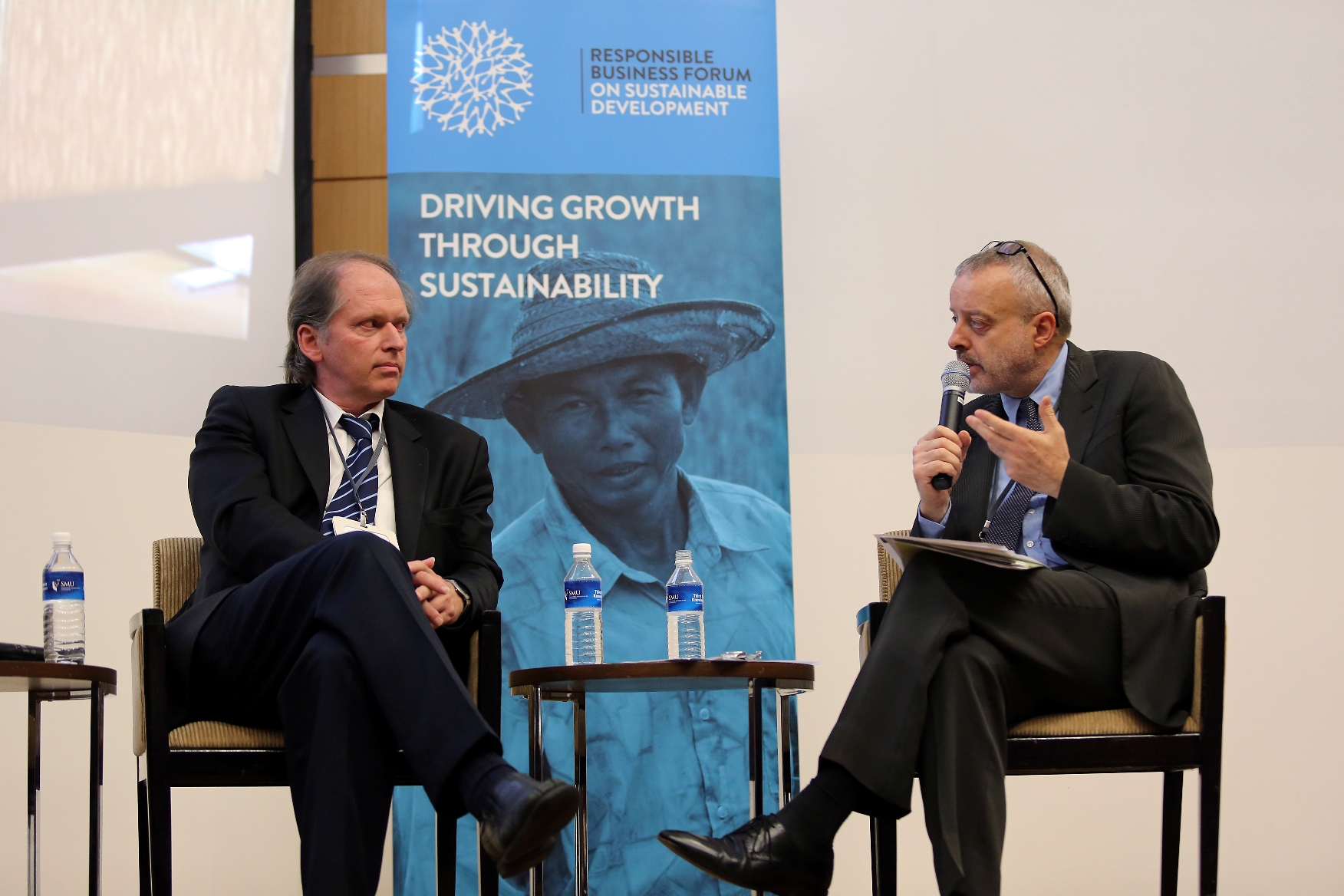
[Above] The forum saw a sterling line-up of speakers and panellists. Seen here is Charles Goddard (right), Editor Director, Asia Pacific, The Economist, moderating a panel discussion on ‘Innovative partnerships to advance sustainability in agriculture, food security and trade’. One of the panellists is Juergen Voegele (left), Director, Agriculture and Rural Development World Bank.
About 250 participants from the business, academic and NGO sectors came together on 6 November 2012 to partake in high-level discussions on global sustainability development. An event organised by Global Initiatives with the Singapore Management University (SMU) as the Knowledge Partner, the first-ever Responsible Business Forum on Sustainable Development held at SMU featured a sterling line-up of global thought leaders who discussed the issues and challenges relating to sustainable business development, and presented practical ways to accelerate solutions on how the twin aims of economic growth and sustainable development can be met.
Associate Professor Annie Koh, SMU’s Vice President, Business Development and External Relations, commented, “Sustainability is a key operational consideration for businesses today. Most stakeholders require that the companies they work for, sell to, buy from and invest in, observe and respect sustainable business practices. Companies that fail to take into account the need to incorporate sustainable development practices into their businesses will find it increasingly difficult to retain their competitive edge.”
“SMU is honoured to play host to this platform which brings together thought leaders in this subject matter. The discussions that take place today will certainly promote the cause among the private and public sectors and in Singapore, and in time to come, put Singapore on track in responsible economic development, in line with the global sustainability agenda,” she added.


[Above] SMU’s Associate Professor for Finance and Vice President for Business Development & External Relations Annie Koh moderating a panel discussion on ‘Impacts and solutions for sustainability across sectors’.
In an effort to nurture a strong sense of business responsibility towards the environment in its students, SMU has started to incorporate the topic of sustainable business development in the academic curriculum of its undergraduate programmes. Students on SMU’s International Trading Concentration are not only taught the finer points of trading, but are also educated about the importance of sustainable practices in the trading value chain. Apart from classroom sessions covering the issue of sustainable practices, these students are given opportunities to participate in field trips to organisations which implement sustainable business practices.
Recent visits included study trips to palm oil plantations and processing facilities in India and Malaysia where they learned first-hand how recycled organic material was used as fertiliser and for power generation, and how the management of the largest oil refinery in the world created green belts to offset carbon and pollution emissions.

[Above] Stuart Harrison, Head of Research and Development APAC, Syngenta AG, delivering his Keynote Address at the forum. Syngenta is a world-leading agri-business committed to sustainable agriculture through innovative research and technology.
The forum also saw the launch of the Business Council for Sustainable Development (BCSD) Singapore and The Economics of Ecosystems and Biodiversity (TEEB) for Business Coalition. BCSD Singapore, which forms part of the World Business Council for Sustainable Development, is an independent membership organisation of forward-thinking companies in Singapore who are committed to creating a sustainable future for business, society and the environment; TEEB for Business Coalition, which is headquartered in Singapore, aims to achieve a shift in corporate behaviour to preserve and enhance rather than deplete our natural capital, and to serve as a cornerstone of current Green Economy Policy.